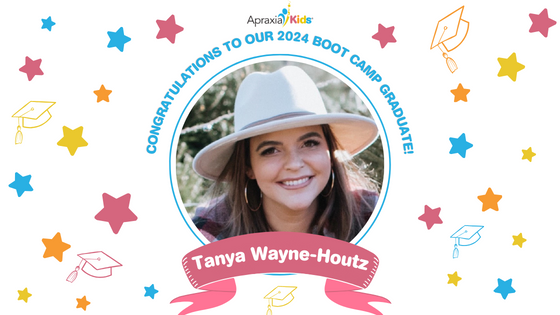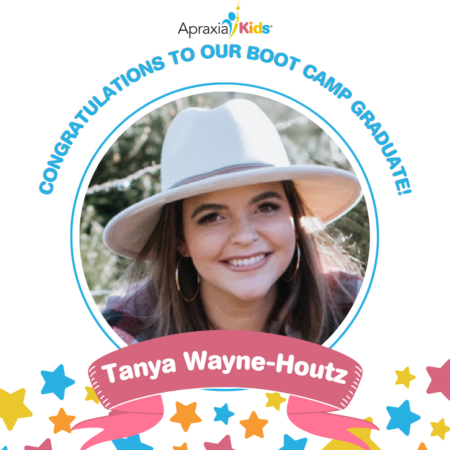
16 Apr CONGRATULATIONS TANYA WAYNE-HOUTZ, MS, CCC-SLP, TSSLD!

Congratulations to Tanya Wayne-Houtz, MS, CCC-SLP, TSSLD, for graduating from the Apraxia Kids Intensive Training Institute (Apraxia Boot Camp)!
Hi everyone! My name is Tanya Wayne-Houtz. I am a New York state licensed SLP, working in south Brooklyn. In addition to private pay, I accept early intervention authorizations. I absolutely love working with little ones with speech motor delay, suspected CAS, and CAS! I service children in their homes or playgroups/schools.
Currently, I live in Woodbridge, New Jersey with my husband, Chris, and four dogs. Chris and I are Hofstra University grads and sweethearts. Outside of work, we love spending a day in the city, heading down to the shore, and traveling to Florida.
Tanya offers services in Brooklyn, New York.
Check out Tanya’s Apraxia Kids SLP Directory Listing to learn more.
Apraxia Kids: What are the top 3 things you learned from this training experience?
Tanya: 1.) How to use the ProCAD to make a differential diagnosis between CAS and pediatric dysarthria 2.) Genetic disorders and other co-morbid conditions when it comes to children with apraxia 3.) A more in-depth knowledge regarding the Principles of Motor Learning.
Apraxia Kids: How did the boot camp experience change or expand your network of colleagues/friends?
Tanya: Boot Camp not only put us in touch with well-known apraxia researchers, but face to face with them! It was a wonderful experience! We can always reach out to them with any questions. Boot Camp participants were also placed in small groups. It’s fun seeing what everyone is up to on social media regarding apraxia (giving presentations, etc.) and cheering them on!
Apraxia Kids: How have you implemented the knowledge you gained at boot camp?
Tanya: I am using the knowledge I gained at boot camp not only during assessment and therapy, but for advocating as well. I am providing early intervention official designees (EIODs) and CPSE administrators with the information they need to approve services for children with suspected CAS/CAS. It is my ultimate goal for the city’s early intervention program to recognize that when the signs of CAS are present, therapy is vital. It doesn’t matter the age. This way, evaluators can make the appropriate recommendations — not deny services. Unfortunately, many evaluators/officials within the city’s early intervention program are still under the belief that apraxia therapy can only begin when a child is 3+.
Apraxia Kids: What is an example of how you have been able to (or plan to) use your expertise as a local resource/support for other professionals and/or families since attending the intensive training?
Tanya: I recently had another SLP observe my session with a child with suspected CAS (we share the case as she is fluent in Yiddish, and yes, apraxia therapy can be conducted in multiple languages! I love when families teach me not only new words, but so much about their culture/religious beliefs!). I provided her with information regarding apraxia — including links to different training courses. I am constantly providing families with information regarding apraxia. I also advocate for children with CAS to help them receive adequate services not only through the early intervention program, but through the CPSE (3-5) program as well.
Apraxia Kids: What would you say to someone considering applying to boot camp next round?
Tanya: Be prepared for A LOT of hard work! But, it’s absolutely worth it! If you are passionate about CAS/motor disorders, do apply!

Congratulations to Tanya Wayne-Houtz, MS, CCC-SLP, TSSLD, for graduating from the Apraxia Kids Intensive Training Institute (Apraxia Boot Camp)!
Hi everyone! My name is Tanya Wayne-Houtz. I am a New York state licensed SLP, working in south Brooklyn. In addition to private pay, I accept early intervention authorizations. I absolutely love working with little ones with speech motor delay, suspected CAS, and CAS! I service children in their homes or playgroups/schools.
Currently, I live in Woodbridge, New Jersey with my husband, Chris, and four dogs. Chris and I are Hofstra University grads and sweethearts. Outside of work, we love spending a day in the city, heading down to the shore, and traveling to Florida.
Tanya offers services in Brooklyn, New York.
Check out Tanya’s Apraxia Kids SLP Directory Listing to learn more.
Apraxia Kids: What are the top 3 things you learned from this training experience?
Tanya: 1.) How to use the ProCAD to make a differential diagnosis between CAS and pediatric dysarthria 2.) Genetic disorders and other co-morbid conditions when it comes to children with apraxia 3.) A more in-depth knowledge regarding the Principles of Motor Learning.
Apraxia Kids: How did the boot camp experience change or expand your network of colleagues/friends?
Tanya: Boot Camp not only put us in touch with well-known apraxia researchers, but face to face with them! It was a wonderful experience! We can always reach out to them with any questions. Boot Camp participants were also placed in small groups. It’s fun seeing what everyone is up to on social media regarding apraxia (giving presentations, etc.) and cheering them on!
Apraxia Kids: How have you implemented the knowledge you gained at boot camp?
Tanya: I am using the knowledge I gained at boot camp not only during assessment and therapy, but for advocating as well. I am providing early intervention official designees (EIODs) and CPSE administrators with the information they need to approve services for children with suspected CAS/CAS. It is my ultimate goal for the city’s early intervention program to recognize that when the signs of CAS are present, therapy is vital. It doesn’t matter the age. This way, evaluators can make the appropriate recommendations — not deny services. Unfortunately, many evaluators/officials within the city’s early intervention program are still under the belief that apraxia therapy can only begin when a child is 3+.
Apraxia Kids: What is an example of how you have been able to (or plan to) use your expertise as a local resource/support for other professionals and/or families since attending the intensive training?
Tanya: I recently had another SLP observe my session with a child with suspected CAS (we share the case as she is fluent in Yiddish, and yes, apraxia therapy can be conducted in multiple languages! I love when families teach me not only new words, but so much about their culture/religious beliefs!). I provided her with information regarding apraxia — including links to different training courses. I am constantly providing families with information regarding apraxia. I also advocate for children with CAS to help them receive adequate services not only through the early intervention program, but through the CPSE (3-5) program as well.
Apraxia Kids: What would you say to someone considering applying to boot camp next round?
Tanya: Be prepared for A LOT of hard work! But, it’s absolutely worth it! If you are passionate about CAS/motor disorders, do apply!
Credentials:
Hours of Operation:
Treatment locations:
Address:
,
Phone:
Email:
Overall Treatment Approach:
Percent of CAS cases:
Parent Involvement:
Community Involvement:
Professional consultation/collaboration:
Min Age Treated:
Max Age Treated:
Insurance Accepted:




